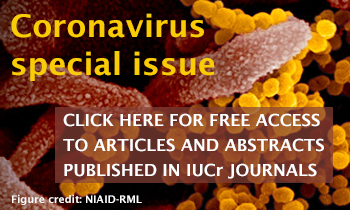issue contents
November 2024 issue

scientific commentaries
NEUTRON | SYNCHROTRON
We draw attention to the exceptional work of Geers et al. [(2024). IUCrJ, 11, 910–920] on the analysis of magnetic phases, in which challenging magnetic structures are determined by a combination of modern computational methods and a connection between nuclear modulation and the ordering of magnetic moments is shown.
research letters
BIOLOGY | MEDICINE
We provide the structure of MltG of the lytic transglycosylase family in this study. We show that MltG has a flexible peptidoglycan-binding domain and exists as a monomer in solution. Further, the putative active site of Mycobacterium abscessus MltG has been revealed using structural analysis and sequence comparison. This research significantly advances our comprehension of the transglycosylation process mediated by the MltG family, providing valuable insights that can inform the development of next-generation antibiotics to specifically target M. abscessus.
PDB reference: MltG, 8yoa
research papers
NEUTRON | SYNCHROTRON
Download citation


Download citation


We show that the modulated phase transitions in solid solutions of [CH3NH3]CoxNi1−x(HCOO)3, with x = 0.25 (1), x = 0.50 (2) and x = 0.75 (3), can be tuned by the metal ratio, which offers the opportunity to consciously build molecular compounds with adjustable properties by doping metal sites.
BIOLOGY | MEDICINE
We present a new implementation of quantum refinement interfacing the widely used Phenix and ORCA software. We show applications on a neutron structure of Mn superoxide dismutase, X-ray structures of V- and Fe-nitrogenase and a cryo-EM structure of particulate methane monooxygenase.
BIOLOGY | MEDICINE
A novel structure-validation method is applied to PDB depositions at 3–5 Å resolution, revealing large numbers of putative register errors.
CRYO | EM
Roodmus is a toolkit sourcing conformational heterogeneity of biomacromolecules from molecular dynamics simulations to generate high-quality synthetic data for the development and benchmarking of heterogeneous reconstruction algorithms.
BIOLOGY | MEDICINE
A global analysis of protein crystal structures in the Protein Data Bank reveals many medium-to-high-resolution entries that lack any solvent molecules. Also, there are many cases with impossible occupancies of water molecules and/or uninterpreted very high difference electron-density peaks that indicate the presence of unmodeled water molecules.
MATERIALS | COMPUTATION
Download citation


Download citation


Ball milling of forsterite (Mg2SiO4) was carried out to mimic mechanical weathering processes on Mars. The defective forsterite structure models, capable of describing both long-range and short-range order, are deduced by density functional theory assisted pair distribution function analysis.
BIOLOGY | MEDICINE
Download citation


Download citation


Structures of the dark-adapted state of a photoactivated adenylate cyclase were determined from serial crystallography (SX) data collected at room temperature at an X-ray free-electron laser and a synchrotron, and are compared with cryo-macromolecular crystallography (MX) synchrotron structures obtained by us and others. These structures of the wild-type enzyme in combination with the cryo-MX synchrotron structure of a light-sensor domain mutant provide insight into the hydrogen-bond network rearrangement upon blue-light illumination and pave the way for the determination of structural intermediates of the enzyme by time-resolved SX.


 journal menu
journal menu




 access
access





















